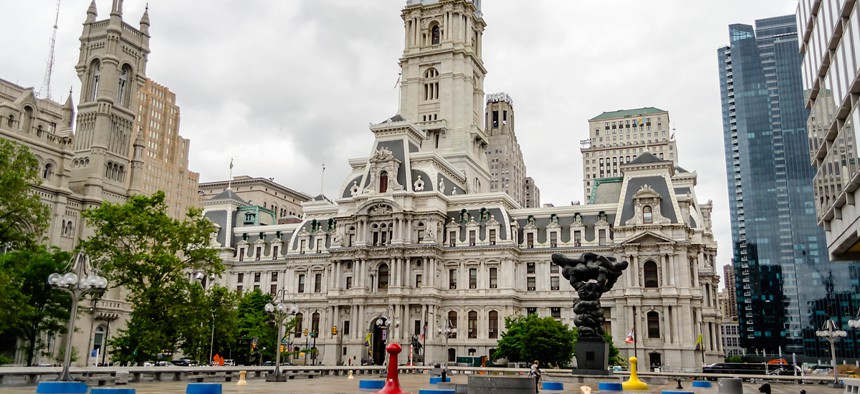Philadelphia Unveils Sweeping Poverty Plan

Philadelphia City Hall. Shutterstock
STATE AND LOCAL ROUNDUP | Chicago mayor rejects proposal to give away police firing authority … Colorado lawmakers push for public insurance option … Idaho increases fees for out-of-state hunters.
A special committee of the Philadelphia City Council unveiled a package of proposals last week aimed at reducing poverty. A 2018 study found that 400,000 residents, nearly 26% of the city’s population, live below the national poverty level. That gives the city the dubious distinction of having the highest poverty rate among the top 10 most populous U.S. cities. The proposed measures, which include policies for rent subsidies, increased adult education opportunities, guaranteed basic income, and tax relief, would lift an estimated 100,000 people out of poverty by 2024. The plan also includes streamlining the process to apply for federally-funded benefits like Section 8 housing vouchers and directing residents to help applying for these resources, an initiative that council members said would cost the city very little. Council President Darrell L. Clarke called the plan and its goals achievable. "One out of every four Philadelphians lives in poverty. That is unacceptable. For the last year, our special committee has met with residents and stakeholders across the city, listening to their best ideas to create jobs and lift people out of poverty. The result is our Action Plan, a public-private partnership with actionable steps and a mission: Lift 100,000 Philadelphians out of poverty by 2024,” he said. The special committee’s plan calls for the establishment of a “Philadelphia Poverty Fund” for city investments and private partner funding. Mayor Jim Kenney seemed receptive to the idea and eager to collaborate with the council. “I’m pleased that this plan and our [administration’s] antipoverty agenda share so much in common because this is the most pressing issue facing our city. But it’s not enough that we’re rowing in the same direction. We need to row faster … Poverty alleviation is traditionally a role of the federal government, but now more than ever, cities like ours must lead on this and other critical issues,” he said. [Philly Voice; Philadelphia Inquirer]
POLICE ACCOUNTABILITY | A grassroots organization wanted Chicago Mayor Lori Lightfoot to give a civilian oversight board the power to fire the police superintendent and set police policy, a proposal she mostly rejected. In a measure that will be introduced to the city council in mid-March, Lightfoot offered a compromise that calls for the mayor retaining the authority to fire police leaders, while offering activists a seat at the policy-making table. The legislation she proposed calls for a seven-member civilian commission that can draft and negotiate policy with the Chicago Police Department. Mayoral aides told the Chicago Sun-Times that the mayor decided to keep firing powers after a civilian police commission in Oakland fired its police chief last month. “You need to look no further than Oakland and what has happened there to see what the downside of that can be,” said a top mayoral aide. Desmon Yancy of the Grassroots Alliance for Police Accountability said he’s still pleased with the suggested changes. “It will increase accountability and improve police community relations and that will make all of us safer—civilians and police officers,” Yancy said. [Chicago Sun-Times]
PUBLIC OPTION | Democratic lawmakers in Colorado have introduced a bill to establish a public health insurance option for residents of the state. The legislation, sponsored by state Rep. Dylan Robert, would form a public-private partnership with insurance companies to offer the option to consumers through the state’s individual marketplace. The option would not be available to people who get their health insurance through their employers. Roberts said that the bill would solve the lack of competition between insurance companies, as there is currently only one insurance option in at least 22 counties in the state. “The days of being forced to pay outrageous premiums because it’s the only option will be over. Every single Coloradoan will have competition in the market regardless of where they live when this bill passes,” he said. Katherine Mulready, the chief strategy officer for the Colorado Hospital Association, said that she has doubts that the reimbursement formula would work out as intended and could threaten the financial stability of the state’s hospitals.“We have 36 hospitals that have a negative margin today and more than half of hospitals fail to achieve the margins needed for long-term sustainability,” Mulready said. [Denver 7]
HUNTING AND FISHING | Idaho Gov. Brad Little signed into law a measure that will significantly increase hunting fees for nonresidents. Residents had complained in recent years that deer and elk hunting seasons were overcrowded with hunters. The state is now capping the number of hunting tags for nonresident hunters and increasing the fees, some of which will be as much as $650 for the same tag that would cost an in-state hunter around $36. [Associated Press]
CHARITY RAFFLES | A bill introduced in the Utah state legislature would legalize charity raffles, a common practice that is actually illegal in the state. Under the legislation, at least 90% of the revenues from the sale of a raffle ticket must be used to benefit a charitable purpose. [FOX 13]
Emma Coleman is the assistant editor for Route Fifty.
NEXT STORY: In Fight Against Coronavirus, Washington State Weighs Stricter Limits on Gatherings






